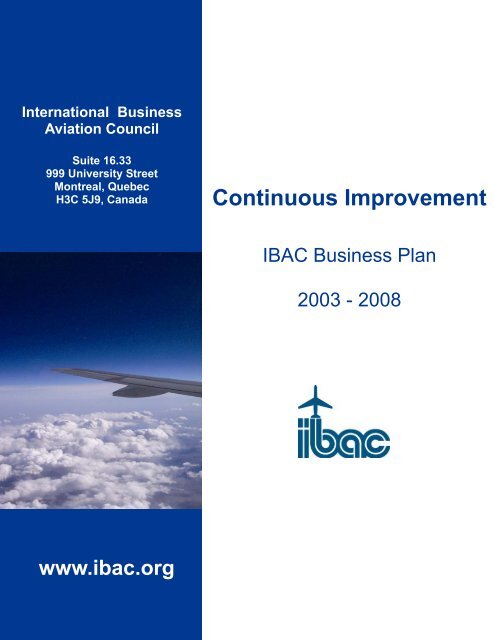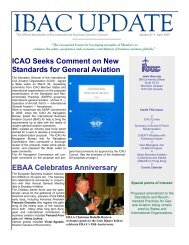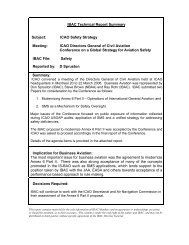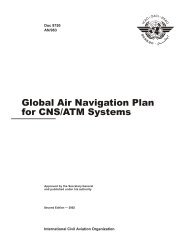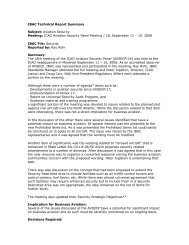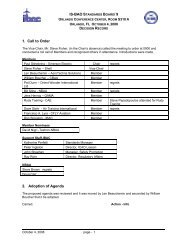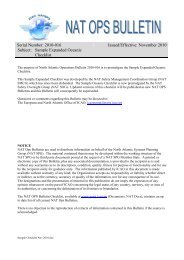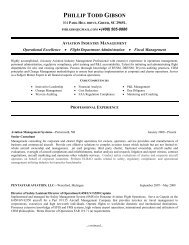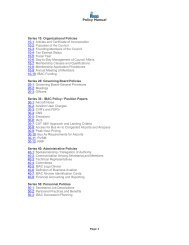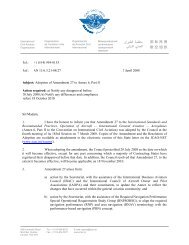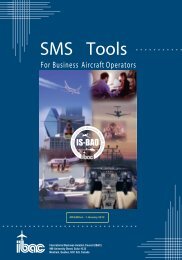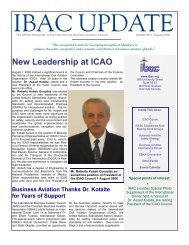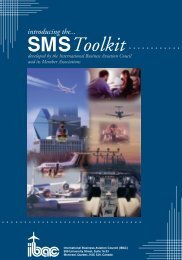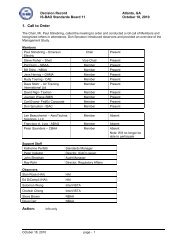IBAC Business Plan 2003-2008 - International Business Aviation ...
IBAC Business Plan 2003-2008 - International Business Aviation ...
IBAC Business Plan 2003-2008 - International Business Aviation ...
Create successful ePaper yourself
Turn your PDF publications into a flip-book with our unique Google optimized e-Paper software.
<strong>International</strong> <strong>Business</strong><br />
<strong>Aviation</strong> Council<br />
Suite 16.33<br />
999 University Street<br />
Montreal, Quebec<br />
H3C 5J9, Canada<br />
Continuous Improvement<br />
<strong>IBAC</strong> <strong>Business</strong> <strong>Plan</strong><br />
<strong>2003</strong> - <strong>2008</strong><br />
www.ibac.org
Preface<br />
Continuous Improvement<br />
<strong>IBAC</strong> is as strong as the collective resolve of its Members.<br />
Achievements in the global aviation community<br />
are dependent on the combined vision,<br />
expectations and leadership of the Council,<br />
and in its ability to work together for common purpose.<br />
This <strong>Business</strong> <strong>Plan</strong> provides the strategic objectives, action plan and financial plan for the<br />
<strong>International</strong> <strong>Business</strong> <strong>Aviation</strong> Council (<strong>IBAC</strong>) for the period covering <strong>2003</strong> to <strong>2008</strong>. Recognizing<br />
that change must be continuous, and that <strong>IBAC</strong> is a progressive and forward looking<br />
organization, the <strong>Plan</strong> will be dynamic and constantly under review, with updates made<br />
approximately every three years or at the call of the <strong>IBAC</strong> Governing Board.<br />
<strong>Aviation</strong> is a large, complex and multinational global industry. It is a highly interdependent<br />
industry, requiring a large number of technical and professional disciplines working in a partnership<br />
to ensure a safe, effective and integrated aviation system. <strong>Business</strong> aviation is one<br />
of the many partners in the global aviation community. As a full and active partner, it fulfills<br />
its obligations in the orderly planning and development of the aviation system.<br />
Given business aviation’s significant size and active participation in the aviation system, the<br />
business aviation community must take a participatory and leadership role in the challenges<br />
inherent in the orderly development and implementation of the world’s airspace and airport<br />
infrastructure and in promoting international harmonization of rules.<br />
This <strong>Business</strong> <strong>Plan</strong> is developed in recognition that the business aviation community must<br />
be an influential and active partner in the global aviation community. The <strong>Business</strong> <strong>Plan</strong> is<br />
dedicated to maintaining and building on effective partnerships within business aviation and<br />
with the broad global aviation community.<br />
Chairman<br />
Director General<br />
<strong>International</strong> <strong>Business</strong> <strong>Aviation</strong> Council<br />
Page 1
Continuous Improvement<br />
<strong>IBAC</strong><br />
Member<br />
Associations<br />
Page 2<br />
<strong>International</strong> <strong>Business</strong> <strong>Aviation</strong> Council
Continuous Improvement<br />
Contents<br />
Renewal for Continuous Improvement<br />
Governance<br />
<strong>IBAC</strong> Corporate Identity<br />
Strategic Objectives<br />
Action <strong>Plan</strong><br />
Financial <strong>Plan</strong><br />
Summary<br />
Appendix<br />
Record of Board Meetings<br />
<strong>International</strong> <strong>Business</strong> <strong>Aviation</strong> Council<br />
Page 3
Continuous Improvement<br />
Page Intentionally Left Blank<br />
Page 4<br />
<strong>International</strong> <strong>Business</strong> <strong>Aviation</strong> Council
Renewal for Continuous Improvement<br />
Continuous Improvement<br />
Objective of Renewal<br />
The <strong>IBAC</strong> <strong>Business</strong> <strong>Plan</strong> was last approved by the Governing Board in 1999. Although the<br />
1999 <strong>Business</strong> <strong>Plan</strong> provided for a five-year horizon, it was agreed that consideration would<br />
be given to updating the <strong>Plan</strong> following three years of operation. This <strong>2003</strong> <strong>Business</strong> <strong>Plan</strong><br />
renewal is dedicated to continuous improvement.<br />
Renewal of the <strong>Business</strong> <strong>Plan</strong> commenced with a Strategic <strong>Plan</strong>ning Meeting, with the Governing<br />
Board and Members reviewing results of the 1999 <strong>Plan</strong> and developing a vision for<br />
business aviation in a ten-year horizon. The final task of the meeting was to consider actions<br />
addressing issues forecasted to impact business aviation in the planning horizon.<br />
The draft renewal plan was then discussed at the 37 th meeting of the <strong>IBAC</strong> Governing Board<br />
and Members; the final <strong>Plan</strong> was approved at the 38 th meeting, in <strong>2003</strong>.<br />
The Strategic <strong>Plan</strong>ning Meeting identified six broad subject groups for attention over the<br />
next five years. They were:<br />
Safety;<br />
Security;<br />
Access;<br />
<strong>Business</strong> sustainability;<br />
Environment; and<br />
Internal management and processes.<br />
Actions to address the issues in each of these broad categories are included in the Action<br />
<strong>Plan</strong>.<br />
Definition of <strong>Business</strong> <strong>Aviation</strong><br />
That sector of aviation which concerns the operation or use of aircraft by companies for<br />
the carriage of passengers or goods as an aid to the conduct of their business, flown for<br />
purposes generally considered not for public hire and piloted by individuals having, at the<br />
minimum, a valid commercial pilot license with an instrument rating.<br />
<strong>International</strong> <strong>Business</strong> <strong>Aviation</strong> Council<br />
Page 5
Continuous Improvement<br />
1999 <strong>Business</strong> <strong>Plan</strong> Revisited<br />
The Strategic <strong>Plan</strong>ning Meeting endorsed the Vision, Mission and Strategic Objectives established<br />
in 1999 and noted the actions made pursuant to the <strong>Plan</strong>. Most of the goals of the<br />
’99 <strong>Plan</strong> were achieved and the Council operated within budget in each of the years of the<br />
<strong>Plan</strong>. The financial position of the Council was enhanced by 125% during the period of the<br />
<strong>Plan</strong> delivery.<br />
Notable achievements pursuant to the 1999 <strong>Business</strong> <strong>Plan</strong> are:<br />
IS-BAO<br />
Development and implementation of IS-BAO;<br />
Introduction of IS-BAO Audit and Certificate of Registration programs;<br />
Substantial increase in representation at ICAO Panels and Work Groups;<br />
Substantial number of Position Papers at ICAO Conferences;<br />
New management structure with <strong>Plan</strong>ning and Operations Committee, Finance<br />
Committee and Work Groups established;<br />
Annual accident statistics and <strong>Business</strong> <strong>Aviation</strong> Safety Brief;<br />
Restructuring and implementation of a new communications policy featuring<br />
an updated website and use of e-mail;<br />
Increase in Aircrew Card distribution and implementation of new design and<br />
technologies; and<br />
Completion of a study of worldwide accident statistics and release of a summary<br />
Brief.<br />
<strong>IBAC</strong>’s number one priority and the most significant initiative evolving from the 1999 <strong>IBAC</strong><br />
<strong>Business</strong> <strong>Plan</strong> was the development and introduction of the <strong>International</strong> Standard for <strong>Business</strong><br />
Aircraft Operations (IS–BAO). The industry standard provides a vast range of benefits<br />
for business aviation as described in the IS-BAO Concept Paper reviewed by the Governing<br />
Board in 2000 (subsequently published in the IS-BAO Brochure and repeated on the IS-BAO<br />
website). The IS-BAO was launched in 2002 and is starting to gain strong acceptance from<br />
the industry. Also launched in 2002 was the Certificate of Registration program. An Audit<br />
Procedures Manual (APM) was published and a workshop developed for auditors and other<br />
interested parties. A total of 15 auditors were accredited in 2002.<br />
A separate <strong>Business</strong> <strong>Plan</strong> for the IS-BAO has been established and approved<br />
by the <strong>IBAC</strong> Governing Board. The IS-BAO <strong>Business</strong> <strong>Plan</strong> summarizes<br />
the financial projections for the IS-BAO. The IS-BAO <strong>Business</strong><br />
<strong>Plan</strong> calls for a revenue neutral operation, although the Governing Board<br />
has agreed to review this principle in 2004-2005.<br />
IS-BAO’s future success is highly dependent on promotion efforts by the<br />
Member Associations and ‘word of mouth’ growth. Ongoing success of the program should<br />
have a very significant positive impact on aviation safety and security.<br />
Page 6<br />
<strong>International</strong> <strong>Business</strong> <strong>Aviation</strong> Council
Continuous Improvement<br />
<strong>IBAC</strong> Focus for <strong>2003</strong> - <strong>2008</strong><br />
<strong>IBAC</strong> is dedicated to providing leadership for business aviation and in working collectively<br />
with other aviation leaders in the design of the aviation system for the future.<br />
<strong>IBAC</strong> has represented business aviation interests for over two decades, and although the<br />
fundamental objectives of the Council are as relevant today as they were when founded in<br />
1981, the rapidly changing global environment necessitates continuous re-evaluation and<br />
improvement of standards and procedures. Characteristics of the changing environment<br />
considered during <strong>IBAC</strong>’s 2002 Strategic <strong>Plan</strong>ning Meeting include the following:<br />
security issues have become more significant to business aviation subsequent<br />
to September 2001 and the resulting focus of regulatory security authorities<br />
around the world;<br />
the significant increase in the number of micro jets in the near future will have<br />
an impact on safety, training and access;<br />
the emergence of vastly different air navigation technologies and systems,<br />
featuring the introduction of CNS/ATM and resulting new cockpit environments<br />
and the need to be more involved in the system design;<br />
continuing globalization and transnationalization of the aviation industry;<br />
rapid growth of aviation in developing regions of the world where safety regulation<br />
is limited or evolving;<br />
constraints on airport and airspace access due to rapid growth of air transport<br />
without an appropriate increase in infrastructure;<br />
rapidly expanding business aircraft community, with increased intercontinental<br />
range operations;<br />
demographic and compensation problems related to the unavailability of<br />
trained maintenance personnel;<br />
air traffic management and airport privatization and the potential for increased<br />
charges;<br />
need for business aviation to promote a unified and cohesive voice; and<br />
the need to actively promote widespread application of the <strong>International</strong> Standard<br />
for <strong>Business</strong> Aircraft Operations (IS-BAO).<br />
<strong>IBAC</strong> is willing to assume an increasing sectorial leadership role, representing business<br />
aviation in developing standards and procedures for acceptance by the world's regulatory<br />
authorities. <strong>IBAC</strong>’s strength is in the power to leverage the extensive professional and<br />
technical resources of its member associations , to serve the community as a whole. <strong>IBAC</strong><br />
will apply this leverage to manage the oversight necessary for the advancement of business<br />
aviation into the future.<br />
<strong>International</strong> <strong>Business</strong> <strong>Aviation</strong> Council<br />
Page 7
Continuous Improvement<br />
Representing <strong>Business</strong> <strong>Aviation</strong> at ICAO<br />
<strong>IBAC</strong> has ICAO approved status at the following Panels and Regional Groups:<br />
• All <strong>Plan</strong>ning and Regional Groups – ICAO (ALLPIRG)<br />
• Air Traffic Management Concept Panel – ICAO (ATMCP)<br />
• Asia Pacific Air Navigation <strong>Plan</strong>ning and Implementation Regional Group – ICAO<br />
(APANPIRG)<br />
• CAR/SAM Regional <strong>Plan</strong>ning and Implementation Group (GREPECAS)<br />
• Committee on <strong>Aviation</strong> Environmental Protection – ICAO (CAEP)<br />
• Select CAEP workgroups.<br />
• European Air Navigation <strong>Plan</strong>ning Group – ICAO (EANPG)<br />
• Global Navigation Satellite System Panel – ICAO (GNSSP)<br />
• ICAO Air Navigation Commission – (ANC)<br />
• North Atlantic Systems <strong>Plan</strong>ning Group – ICAO (NAT SPG)<br />
• North Atlantic Implementation Management Group (NAT/IMG)<br />
• North Atlantic Economics and Finance Group (NAT/EFG)<br />
• North Atlantic Air Traffic Management Group (NAT/ATMG)<br />
• Operations Panel (OPSP)<br />
• Airport Economics Panel (AEP)<br />
• Air Navigation Services Economics Panel (ANSEP)<br />
• Facilitation Panel (FALP)<br />
• <strong>Aviation</strong> Security Panel (AVSECP)<br />
• Flight Crew Licensing and Training Panel (FCLTP)<br />
Page 8<br />
<strong>International</strong> <strong>Business</strong> <strong>Aviation</strong> Council
Continuous Improvement<br />
Governance<br />
Incorporation<br />
<strong>IBAC</strong> was incorporated in Washington D.C. in 1981.<br />
Bylaws<br />
<strong>IBAC</strong> Bylaws were initially established September 14, 1981, and amended on November 22,<br />
1996 and August 5, 1997. The Bylaws are reproduced on the <strong>IBAC</strong> web page at<br />
www.ibac.org.<br />
Governing Board<br />
The management and business concerns of the Council are vested with the Governing<br />
Board. The Governing Board is responsible for establishing policies and controls necessary<br />
and desirable for the orderly conduct of the Council’s affairs.<br />
Management<br />
The day-to-day operations of <strong>IBAC</strong> are managed by a Director General appointed by the<br />
Board, who serves as the Council’s Chief Operating Officer. In addition, the management<br />
team consists of:<br />
Policies<br />
a Director, ICAO Liaison;<br />
a Standards Manager;<br />
a Corporate Secretary;<br />
Technical Representatives;<br />
Support Staff; and<br />
Professional Services, as required.<br />
The day-to-day management of <strong>IBAC</strong>’s affairs are conducted in accordance with policies<br />
approved by the Council’s Governing Board. The <strong>IBAC</strong> Policy Manual is continuously under<br />
review to ensure current and effective direction.<br />
Meetings<br />
<strong>IBAC</strong> Bylaws require that meetings of the Governing Board are held at a minimum once per<br />
year, but they have routinely been held twice per year to accommodate the necessary work.<br />
See record in Attachment A.<br />
<strong>International</strong> <strong>Business</strong> <strong>Aviation</strong> Council<br />
Page 9
Continuous Improvement<br />
<strong>IBAC</strong>’s Governing Organization<br />
Governing Board<br />
1. Chairman<br />
2. Representative from each Member<br />
Organization<br />
3. Finance Committee<br />
<strong>IBAC</strong> Secretariat<br />
Corporate Secretary<br />
1. Director General is<br />
Chief Operating Officer<br />
2. Director ICAO Liaison<br />
3. Standards Manager,<br />
Technical Representatives & support<br />
<strong>Plan</strong>ning & Operations Committee<br />
1. Chaired by the Director General<br />
2. Executive head or representative of<br />
each member organization<br />
Technical Committees<br />
1. Ad hoc Committees for technical<br />
matters<br />
Technical Committees<br />
1. Permanent committees for specific<br />
technical matters<br />
Page 10<br />
<strong>International</strong> <strong>Business</strong> <strong>Aviation</strong> Council
Continuous Improvement<br />
<strong>IBAC</strong> Corporate Identity<br />
Vision<br />
<br />
The recognized forum for leveraging strengths of Members to enhance the safety,<br />
acceptance and economic contribution of business aviation globally.<br />
Mission<br />
<br />
To serve the needs of Members internationally and to foster mutual cooperation.<br />
Values<br />
<br />
<br />
<br />
<br />
<br />
Professionalism<br />
Integrity<br />
Respect<br />
Teamwork<br />
Accountability<br />
<strong>IBAC</strong>’s Operating Principles are to:<br />
1. Promote safe, secure and environmentally responsible business aircraft operations.<br />
2. Provide effective communication internally and externally.<br />
3. Leverage the experience, knowledge and availability of resources in member organizations,<br />
to the benefit of the whole.<br />
4. Facilitate business aircraft operations internationally.<br />
5. Encourage the fair and equitable treatment of business aviation by civil aviation authorities,<br />
standards setters and service providers.<br />
6. Promote the safe and orderly growth of business aviation throughout the world.<br />
7. Promote the growth of the Council membership.<br />
8. Participate as a full partner in international planning and implementation forums.<br />
<strong>International</strong> <strong>Business</strong> <strong>Aviation</strong> Council<br />
Page 11
Continuous Improvement<br />
Advantages of Operating a <strong>Business</strong> Aircraft<br />
• Financial savings for many travel options.<br />
• Maximizing personal safety, security and peace of mind.<br />
• Maximizing business opportunities by getting the right people to the right place at<br />
the right time.<br />
• Efficient employee scheduling and employee time saved.<br />
• Increasing productivity enroute.<br />
• Minimizing non-business hours away from home.<br />
• Ensuring industrial security.<br />
• Exercising management control over efficient, reliable scheduling.<br />
• Projecting a positive corporate image.<br />
• Attracting and retaining key people.<br />
• Reducing post-trip fatigue<br />
• Optimizing payroll.<br />
• Charging the entrepreneurial spirit.<br />
Page 12<br />
<strong>International</strong> <strong>Business</strong> <strong>Aviation</strong> Council
Continuous Improvement<br />
Strategic Objectives<br />
Strategic Objective 1<br />
Foster safe, secure and efficient global business aviation operations.<br />
(Safety, Security and Efficiency)<br />
Strategic Objective 2<br />
Seek means to achieve fair and equitable access by business aviation to the world’s airports<br />
and airspace.<br />
(Equitable Access)<br />
Strategic Objective 3<br />
Contribute to the orderly development of a safe, secure, efficient and environmentally responsible<br />
global aviation system, through participating and contributing as a partner in international<br />
standards and planning forums.<br />
(Standards and <strong>Plan</strong>ning Forums)<br />
Strategic Objective 4<br />
Establish an international presence and structured management programme representing<br />
global business aviation interests.<br />
(Presence)<br />
Strategic Objective 5<br />
Promote the growth of business aviation throughout the world.<br />
(Growth)<br />
<strong>International</strong> <strong>Business</strong> <strong>Aviation</strong> Council<br />
Page 13
Continuous Improvement<br />
Page Intentionally Left Blank<br />
Page 14<br />
<strong>International</strong> <strong>Business</strong> <strong>Aviation</strong> Council
Continuous Improvement<br />
Action <strong>Plan</strong><br />
Strategic Objective 1<br />
Foster safe, secure and efficient global business aviation operations.<br />
Action <strong>Plan</strong><br />
1.1 Monitor and study worldwide aviation safety data and develop proposals to change<br />
standards in response to safety issues and initiatives applicable to business aviation.<br />
1.2 Publish an annual summary of global business aviation safety data.<br />
1.3 Complete an analysis of the <strong>Business</strong> <strong>Aviation</strong> Safety Brief to determine the statistical<br />
validity of its assumptions.<br />
1.4 Complete an analysis of the accident record to determine if the IS-BAO may have<br />
reduced the probability of the accidents occurring.<br />
1.5 Continue to actively promote the <strong>International</strong> Standard for <strong>Business</strong> Aircraft Operations<br />
(IS-BAO), in particular emphasizing the importance of a good safety standard<br />
for entry-level operators.<br />
1.6 Promote IS-BAO and its benefits to manufacturers, insurance companies and<br />
regulatory authorities.<br />
1.7 Manage ongoing improvement and delivery of the IS-BAO and present IS-BAO<br />
Workshops to satisfy demand.<br />
1.8 Develop a plan to incorporate a pilot decision making section in IS-BAO.<br />
1.9 Ensure that new ICAO Standards and Recommended Practices (SARPS) for <strong>Aviation</strong><br />
Security recognize the specific requirements of business aviation.<br />
1.10 Promote and assist in development of an FBO Security Program.<br />
1.11 Develop a plan to promote business aviation security within the community, with<br />
the goal being the improvement of security in business aviation operations.<br />
1.12 Develop a policy regarding Flight Data Monitoring Systems.<br />
1.13 Complete a study on competence of aircrew that may be required for accessing<br />
the upper level airspace system.<br />
<strong>International</strong> <strong>Business</strong> <strong>Aviation</strong> Council<br />
Page 15
Continuous Improvement<br />
1.14 Administer the <strong>IBAC</strong> aircrew identification card program.<br />
1.15 Work with and encourage ICAO to adopt a universal global aircrew identification<br />
system compatible with business aviation objectives.<br />
1.16 Contribute to the development of JAR OPS 0 & 2 requirements and promote the<br />
use of incorporated industry standards.<br />
1.17 Maintain good communication linkages with civil aviation authorities, to promote<br />
conflict resolution assistance.<br />
Strategic Objective 2<br />
Seek means to achieve fair and equitable access by business aviation to the world’s airports<br />
and airspace.<br />
Action <strong>Plan</strong><br />
2.1 Support a study of global airport access issues, in coordination with ICAO or as a<br />
separate study.<br />
2.2 Present papers to public representatives, officials, airport owners/operators and<br />
municipal leaders on the benefits of business aviation to achievement of local prosperity.<br />
2.3 Develop and distribute promotional material on advantages of regional airports as<br />
economic generators, with the airport used by clean quiet business aviation aircraft.<br />
2.4 Update the <strong>IBAC</strong> Video titled “<strong>Business</strong> <strong>Aviation</strong> – A Key to Community Prosperity”<br />
with information gathered over two years of use.<br />
2.5 Complete a study of customs and cabotage issues impacting the business aviation<br />
environment.<br />
2.6 Complete a study on how taxes impact business aviation.<br />
2.7 Review and update <strong>IBAC</strong> policy on ANS and Airport charges.<br />
2.8 Develop a process to capture early identification of access issues.<br />
Page 16<br />
<strong>International</strong> <strong>Business</strong> <strong>Aviation</strong> Council
Continuous Improvement<br />
Strategic Objective 3<br />
Contribute to the orderly development of a safe, secure, efficient and environmentally responsible<br />
global aviation system, through participating and contributing as a partner in international<br />
standards and planning forums.<br />
Action <strong>Plan</strong><br />
3.1 Continue strong communication links with the ICAO Council and Air Navigation<br />
Commission, and participate on ICAO Panels of interest to business aviation.<br />
3.2 Continue strong communication links with IATA, ACI, IFALPA, IAOPA, IFATCA,<br />
CANSO and other aviation organizations.<br />
3.3 Represent business aviation interests at RTCA, ARINC and other standards setting<br />
forums.<br />
3.4 Increase the membership and scope of the <strong>Plan</strong>ning and Operations Committee<br />
(POC).<br />
3.5 Increase the distribution of the POC Decision Record to include Governing Board<br />
Members.<br />
3.6 Promulgate a policy on environmental emissions for promotion to ICAO.<br />
Strategic Objective 4<br />
Establish an international presence and structured management programme to represent<br />
global business aviation interests.<br />
Action <strong>Plan</strong><br />
4.1 Continue strong linkages with ICAO and other international bodies, and ensure<br />
summarized information reaches members on a timely basis. To accomplish this to<br />
best effect, obtain additional office space in the ICAO Headquarters Building.<br />
4.2 Contribute widely to aviation journals.<br />
4.3 Participate as speakers at international aviation events.<br />
4.4 Develop generic aviation policies on behalf of the Council Members, for national application<br />
as each member determines appropriate.<br />
4.5 Update <strong>IBAC</strong> policies applicable to staff responsibilities (position descriptions).<br />
<strong>International</strong> <strong>Business</strong> <strong>Aviation</strong> Council<br />
Page 17
Continuous Improvement<br />
4.6 Develop succession-planning guidelines for <strong>IBAC</strong> staff.<br />
4.7 Conduct a review of potential revenue sources for <strong>IBAC</strong> and develop proposals for<br />
a policy on member contributions.<br />
Strategic Objective 5<br />
Promote the growth of business aviation throughout the world.<br />
Action <strong>Plan</strong><br />
5.1 Develop and introduce a new kiosk concept, which better reflects the coordination<br />
and cooperation of all business aviation associations and the value to all flight departments<br />
of having representative bodies.<br />
5.2 Develop a plan for the gradual increase of the <strong>IBAC</strong> Membership.<br />
5.3 Develop a plan in conjunction with Member Associations to improve the visibility of<br />
business aviation representative associations and their cooperative working arrangements.<br />
Dimensions of <strong>Business</strong> <strong>Aviation</strong> Worldwide<br />
• Approximately 22,500 turbine-powered aircraft<br />
• Approximately 12,000 jet aircraft<br />
• Over 14,000 operating companies<br />
Page 18<br />
<strong>International</strong> <strong>Business</strong> <strong>Aviation</strong> Council
Continuous Improvement<br />
Financial <strong>Plan</strong><br />
Financial Summary<br />
This five-year projection of revenues and expenditures provides an overview of how <strong>IBAC</strong><br />
proposes to exercise its strategic objectives. Since <strong>IBAC</strong> is a non-profit organization, the<br />
summary reflects the balance between revenues and expenditures.<br />
Financial Management Principles<br />
1.<br />
2.<br />
3.<br />
4.<br />
5.<br />
6.<br />
As an organization created to represent the collective interests of its members, the<br />
primary source of funding is from member contributions.<br />
Additional operational revenue sources will be developed and maintained to supplement<br />
or reduce member contributions where considered appropriate by the Governing<br />
Board (i.e. the aircrew card).<br />
Funding assistance for specific projects will be sought on an ad hoc basis (for example<br />
- hosting an event or production of promotional material such as videos, brochures<br />
etc.).<br />
No deficit will be contemplated, with the target being a balance between revenues<br />
and expenditures.<br />
A Reserve fund shall be established and maintained in accordance with<br />
Policy 40-8.<br />
Expenditures will be managed by <strong>IBAC</strong>’s Director General, and overseen by the Finance<br />
Committee, in accordance with the approved <strong>Business</strong> <strong>Plan</strong> as updated by<br />
the annually approved budget.<br />
Revenues (USD)<br />
<strong>2003</strong> 2004 2005 2006 2007<br />
Contributions $277,800. $278,500. $282,000. $283,000. $284,000.<br />
Operations $45,000. $45,000. $45,000. $45,000. $45,000.<br />
Interest Income $2,500. $5,000 $5,500. $6,000. $6,500.<br />
Total Revenues * $325,300. $328,500. $332,500. $334,000. $335,500.<br />
*One of <strong>IBAC</strong>’s strategic objectives is to increase membership. Increased contributions will provide improved leverage<br />
to assist business aviation globally.<br />
<strong>International</strong> <strong>Business</strong> <strong>Aviation</strong> Council<br />
Page 19
Continuous Improvement<br />
Expenditures USD<br />
<strong>2003</strong> 2004 2005 2006 2007<br />
1. Staff (3 pers) $138,000. $142,000. $142,000. $143,000. $144,000.<br />
2. Office Lease $14,500. $14,500. $15,000. $15,000. $15,000.<br />
3. Furniture & Equipment<br />
4. Supplies, Postage<br />
and Telephone<br />
$12,000. $10,000. $10,000. $10,000. $10,000.<br />
$12,000. $14,200. $14,200. $15,000. $15,000.<br />
5. Insurance $6,000. $6,000. $6,000. $8,000. $8,000.<br />
6. Professional Fees $6,000. $6,000. $6,000. $6,000. $6,000.<br />
7. Publications<br />
(Newsletter, Promotional<br />
Material, Website)<br />
8. Staff travel, hospitality<br />
and technical forums<br />
$11,000. $11,000. $11,000. $11,500. $12,000.<br />
$50,000. $54,000. $54,000. $54,000. $54,000.<br />
9. Aircrew Card ops. $11,500. $9,500. $9,500. $10,000. $10,000.<br />
10. Contract Services<br />
(Studies & techn representation)<br />
11. Travel for Tech<br />
Reps<br />
12. Promotion at Conferences<br />
13. Contingencies &<br />
Miscellaneous<br />
$16,000. $17,000. $17,000. $17,000. $17,000.<br />
$34,200. $25,000. $25,000. $25,000. $25,000.<br />
$3,000. $3,500. $3,500. $3,500.<br />
$14,100. $16,300. $19,300. $16,000. $16,000.<br />
Totals $325,300. $328,500. $332,500. $334,000. $335,500.<br />
IS-BAO Financial Management<br />
In accordance with <strong>IBAC</strong> Policy, the IS-BAO is managed to be revenue neutral. The IS-BAO<br />
<strong>Business</strong> <strong>Plan</strong> is the authoritative document, giving the Director General approval for the ongoing<br />
management of the IS-BAO program.<br />
Page 20<br />
<strong>International</strong> <strong>Business</strong> <strong>Aviation</strong> Council
Continuous Improvement<br />
Summary<br />
The globalization of all sectors of the aviation community, including business aviation, demands<br />
that business aviation has an institutional body to provide a voice in the development<br />
and coordination of safety, security and environmental standards, airspace design and airport<br />
infrastructure. The business aviation community is resolved to assume an active role in<br />
the evolution of the aviation system and to help in the design of the system for the future.<br />
The <strong>IBAC</strong> Governing Board, representing the eleven regional and national associations that<br />
make up the <strong>IBAC</strong> partnership, has resolved that <strong>IBAC</strong> will work towards continuous improvement.<br />
Although good progress was made through the period of the last <strong>Business</strong> <strong>Plan</strong><br />
(1999-2004), there is still much to be done to ensure progressive recognition of the <strong>IBAC</strong><br />
Strategic Objectives.<br />
This <strong>Plan</strong> provides the framework for <strong>IBAC</strong>’s continuous improvement.<br />
ICAO Assembly 2001<br />
Courtesy ICAO<br />
<strong>International</strong> <strong>Business</strong> <strong>Aviation</strong> Council<br />
Page 21
Continuous Improvement<br />
Page Intentionally Left Blank<br />
Page 22<br />
<strong>International</strong> <strong>Business</strong> <strong>Aviation</strong> Council
Continuous Improvement<br />
Appendix A<br />
Record of Board Meetings<br />
No Date(s) Location Time Between Comments<br />
#0 14 September 1981 Anaheim 0 Begin Ceremonial<br />
#1 20-21 January 1982 Montreal 4 months ICAO<br />
#2 20-21 May 1982 Hanover 4 months ILA '82<br />
#3 10-11 November 1982 London 4 months BAe<br />
#4 25-26 May 1983 Paris 6 months Dassault<br />
#5 7-8 October 1983 Dallas 5 months Bell w/NBAA<br />
#6 20-21 June 1984 Brussels 8 months Abelag<br />
#7 19-20 February 1985 Montreal 8 months ICAO w/Kotaite<br />
#8 29-30 October 1985 London 8 months Aero Society<br />
#9 7-9 May 1986 Vancouver 7 months w/CBAA<br />
#10 5-7 February 1987 Genoa 9 months Piaggio<br />
#11 2-3 October 1987 New Orleans 8 months w/NBAA<br />
#12 2-3 May 1988 Hanover 9 months w/ILA<br />
#13 20-22 February 1989 Montreal 11 months w/CBAA<br />
#14 27-28 November 1989 Gold Coast 9 months w/ABAA<br />
#1Spl 17 August 1990 Montreal (Special) Special<br />
#15 5-6 October 1990 New Orleans 11 months w/NBAA<br />
#16 24-25 June 1991 Munich 8 months w/P.A.Show<br />
#17 31 March - 1 April 1992 Montreal 9 months<br />
#18 25-26 Sept 1992 Dallas 6 months w/NBAA<br />
<strong>International</strong> <strong>Business</strong> <strong>Aviation</strong> Council<br />
Page 23
Continuous Improvement<br />
No Date(s) Location Time Between Comments<br />
#19 11-12 June 1993 Edinburgh 9 months BAUA host<br />
#20 23-23 March 1994 Melbourne 9 months ABAA host<br />
#21 7 October 1994 New Orleans 7 months w/NBAA<br />
#22 6-7 April 1995 Brussels 6 months EBAA host<br />
#23 11-12 August 1995 Vancouver 4 months CBAA<br />
#24 4-5 April 1996 Rio 8 months ABAG host<br />
#2Spl 6-7 September 1996 UK (Special) Farnborough<br />
#25 22-23 November 1996 Orlando 7 months w/NBAA<br />
#26 5 August 1997 Vancouver 9 month w/CBAA<br />
#27 8 May 1998 Washington 9 months at NBAA, changed from<br />
South Africa<br />
#28 22 October 1998 Las Vegas 5 months at NBAA<br />
#29 6-7 May 1999 Montreal 7 months at ICAO<br />
#30 15 October 1999 Atlanta 5 months at NBAA<br />
#31 8-9 June 2000 Montreal 8 months at ICAO<br />
#32 13 October 2000 New Orleans 4 months at NBAA<br />
#33 21 April 2001 Geneva 6 months at EBACE<br />
#34 21 September New Orleans 5 months at NBAA<br />
#35 20 June 2002 Montreal 9 months at CBAA<br />
#36 13-14 Sept 2002 Orlando 3 months at NBAA<br />
#37 9 May <strong>2003</strong> Geneva 8 months at EBACE<br />
#38 10 October <strong>2003</strong> Orlando 5 months at NBAA<br />
Page 24<br />
<strong>International</strong> <strong>Business</strong> <strong>Aviation</strong> Council


